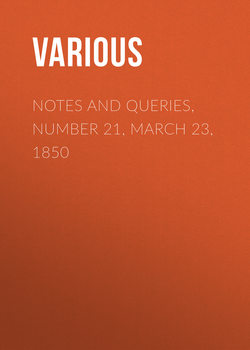Читать книгу Notes and Queries, Number 21, March 23, 1850 - Various - Страница 3
BIS DAT QUI CITÒ DAT
ОглавлениеInquiry has been often made as to the origin of this proverb. Alciatus is referred to generally as the authority whence it was derived. I think, however, it may be traced to Publius Syrus, who lived about forty-four years before Christ. It is equally probable, from the peculiar species of composition in which the thought, if not the exact words are found, that the proverb was derived from another and an earlier source. The object of mimic exhibitions is to impress the mind by imitation. Human life is burlesqued, personal defect heightened and ridiculed; character is never represented in degree, but in extremes. The dialogue of satirical comedy assumes naturally the form of the apophthegm—it is epigrammatic and compressed that it may be pungent and striking. Hence, no species of writing is more allied to or more likely to pass into household words, and to become proverbs among a people of quick retentive powers, such as the Greeks were, to whom we are perhaps indebted for this. I send you the extract from Alciatus; Emblemata, No. 162. Antverpiæ, 18mo. 1584. Apud Christophorum Plantinum.
"Tres Charites Veneri assistunt, dominamque sequuntur:
Hincque voluptates, atque alimenta parant;
Lætitiam Euphrosyne, speciosum Aglaia nitorem;
Suadela est Pithus, blandus et ore lepos.
Cur nudæ? mentis quoniam candore venustas
Constat, et eximia simplicitate plucet.
An quia nil referunt ingrati, atque arcula inanis
Est Charitum? qui dat munera, nudus eget.
Addita cur nuper pedibus talaria? Bis dat
Qui citò dat—Minimi gratia tarda pretî est.
Implicitis ulnis cur vertitur altera? gratus
Fenerat: huic remanent una abeunte duæ.
Jupiter iis genitor, coeli de semine divas
Omnibus acceptas edidit Eurynome."
Now here we have the proverb clearly enough.
I subjoin the note upon the lines in which it appears.
"Bis dat qui cito dat," in Mimis Publii. "Beneficium inopi bis dat, qui dat celeriter." Proverb, Bis dat, &c.
Referring to the Sentences of Publius Syrus, published, with the additional Fables of Phædrus, from the Vatican MSS., by Angelo Mai, I found the line thus given:
"Inopi beneficium bis dat, qui dat celeriter."
The same idea, I believe, occurs in Ovid. Query whether it is not a thought naturally presenting itself to the mind, reflected by memory, confirmed by experience, and which some Mimic author has made proverbial by his terse, gnomic form of expression.
S.H.
